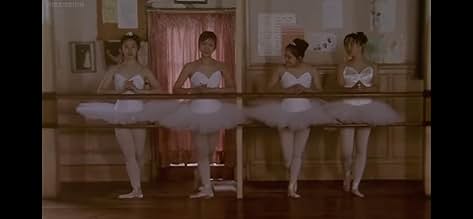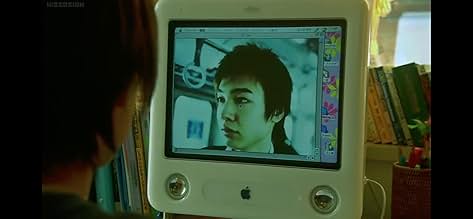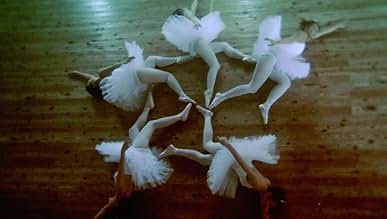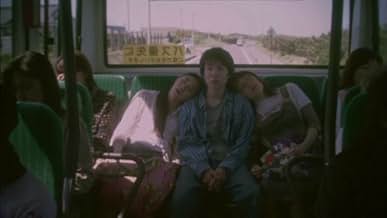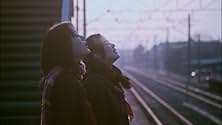Hana to Arisu
- 2004
- 2h 15min
NOTE IMDb
7,2/10
5,2 k
MA NOTE
Ajouter une intrigue dans votre langueWhen two best friends develop a crush on the same boy, they develop a plan to trick him into dating them.When two best friends develop a crush on the same boy, they develop a plan to trick him into dating them.When two best friends develop a crush on the same boy, they develop a plan to trick him into dating them.
- Réalisation
- Scénario
- Casting principal
- Récompenses
- 1 victoire au total
Avis à la une
The base layer here is teenage romance tweaked a little to frame episodes of ordinary life. Two schoolgirls fall in love with an aloof boy who believes he suffers from amnesia.
Annotating this is Celine and Julie Go Boating, which was about two girls embarking upon dreamlike adventure and mischief around modern Paris. What was so remarkable about it were precisely the elusive controls: the film didn't give out that we were, in fact, daydreaming until we were too far in to know exactly where. The clue was already laid out in the first scene, a cat of mysterious eyes and a peculiar chase through empty streets.
So you will have to pay attention to the opening scenes of Iwai's film, echoing this. Once again a chase in and out of subway cars as giggly play between the two girls. The other clue is obvious enough: Alice.
This layer borrows Rivette's whimsical light structure. Roles, guises, fiction, synchronous games about the fabrication of narratives, in our case centered at this boy who remembers nothing, is empty space, a blank stage, and the plays the girls assemble around him. He's told he was in love with one, then both. They both act parts, fashion entire pasts and emotions.
So love as this game of fiction, and getting to allow to be seduced by an image. This is excellent work, and in how it's subtly acknowledged inside the film: one girl signs up for a drama class, and has in fact done so to be close to the boy, himself an actor, the other is randomly approached on the street to model for TV commercials - and this may well reference Mikio Naruse's wonderful Street without Return from '34.
So the third layer is how the play is going to be resolved on a level behind the base narrative of ordinary life, and into the stage where love is the heightened game of duplicity.
One ploy is simple enough, opening day for the school play both girl and boy were rehearsing and a near-perfect rendition of the mechanisms that give rise to images: out on the stage performance, roles, fiction consumed as real, and backstage the internal machinations of tortured soul. The other is a little more intricate because of how unassuming: Alice auditions for a part in TV commercial.
Now so far this is no different than a French film. Notice what Iwai does, an extra layer that is deeply Japanese. Now the Japanese idea of high beauty and by extension performance, what is often perceived as quaint reticence, is formless heart expressed in visible form. Meditation.
But even a patriarch of Chan like Hongren could not so simply gauge his pupils' inner heart when the time came to decide for a succesor. What he asked instead, was that they write poems on a wall about it. This is a frequent practice in Buddhism. Painting a cycle will do, an 'ensho' meaning awareness. The hand will tell.
Now all through the film Hana has secretly contrived to cling to her object of desire, has lied and deceived. But when it comes to expressing inner self, we note that she is, in fact, a bad actress. Iwai intercuts her melodramatic reactions backstage with the actor's mock-mannerisms out on the stage. The auditorium is empty when she finally gets out for her part.
On the other hand Alice. She has been part of the ploy but with a certain affection for the part and with genuine feelings. So much so that it slipped from her, a bad actress in terms of the conventional drama of the world. We trust however that even though the image is false, she's moved to it truthfully. Her audition is to play an image on a screen. Instead the director decides on a whim that he wants her to do a ballet dance as per her resume, and in a short skirt, an almost humiliating prospect. What does she do? Channeling true self into the thing, she amazes with her skills.
So what do we get, between these two girls? Flowers in the sky, Hana meaning flower, reflecting Zen Master Dogen's notions of illusory mind images.
And on the other hand, the subtlest difference. Emptiness in full bloom. Or in the words of Dogen: being one with just this, while being free from just this.
Something to meditate upon.
Annotating this is Celine and Julie Go Boating, which was about two girls embarking upon dreamlike adventure and mischief around modern Paris. What was so remarkable about it were precisely the elusive controls: the film didn't give out that we were, in fact, daydreaming until we were too far in to know exactly where. The clue was already laid out in the first scene, a cat of mysterious eyes and a peculiar chase through empty streets.
So you will have to pay attention to the opening scenes of Iwai's film, echoing this. Once again a chase in and out of subway cars as giggly play between the two girls. The other clue is obvious enough: Alice.
This layer borrows Rivette's whimsical light structure. Roles, guises, fiction, synchronous games about the fabrication of narratives, in our case centered at this boy who remembers nothing, is empty space, a blank stage, and the plays the girls assemble around him. He's told he was in love with one, then both. They both act parts, fashion entire pasts and emotions.
So love as this game of fiction, and getting to allow to be seduced by an image. This is excellent work, and in how it's subtly acknowledged inside the film: one girl signs up for a drama class, and has in fact done so to be close to the boy, himself an actor, the other is randomly approached on the street to model for TV commercials - and this may well reference Mikio Naruse's wonderful Street without Return from '34.
So the third layer is how the play is going to be resolved on a level behind the base narrative of ordinary life, and into the stage where love is the heightened game of duplicity.
One ploy is simple enough, opening day for the school play both girl and boy were rehearsing and a near-perfect rendition of the mechanisms that give rise to images: out on the stage performance, roles, fiction consumed as real, and backstage the internal machinations of tortured soul. The other is a little more intricate because of how unassuming: Alice auditions for a part in TV commercial.
Now so far this is no different than a French film. Notice what Iwai does, an extra layer that is deeply Japanese. Now the Japanese idea of high beauty and by extension performance, what is often perceived as quaint reticence, is formless heart expressed in visible form. Meditation.
But even a patriarch of Chan like Hongren could not so simply gauge his pupils' inner heart when the time came to decide for a succesor. What he asked instead, was that they write poems on a wall about it. This is a frequent practice in Buddhism. Painting a cycle will do, an 'ensho' meaning awareness. The hand will tell.
Now all through the film Hana has secretly contrived to cling to her object of desire, has lied and deceived. But when it comes to expressing inner self, we note that she is, in fact, a bad actress. Iwai intercuts her melodramatic reactions backstage with the actor's mock-mannerisms out on the stage. The auditorium is empty when she finally gets out for her part.
On the other hand Alice. She has been part of the ploy but with a certain affection for the part and with genuine feelings. So much so that it slipped from her, a bad actress in terms of the conventional drama of the world. We trust however that even though the image is false, she's moved to it truthfully. Her audition is to play an image on a screen. Instead the director decides on a whim that he wants her to do a ballet dance as per her resume, and in a short skirt, an almost humiliating prospect. What does she do? Channeling true self into the thing, she amazes with her skills.
So what do we get, between these two girls? Flowers in the sky, Hana meaning flower, reflecting Zen Master Dogen's notions of illusory mind images.
And on the other hand, the subtlest difference. Emptiness in full bloom. Or in the words of Dogen: being one with just this, while being free from just this.
Something to meditate upon.
Hana and Alice are good friends and they do everything together. They go to the same high school and they go to school together. One day Hana falls in love with a boy who goes to the same high school. Hana deceives the boy and gets him. However, the boy loves Alice and Alice also loves him. What will happen to the relationship of the three.
I have a lot of friends but I don't have friends like Hana and Alice. They are always together and they say everything each other. They look happy and I think it is good thing. However friends sometimes become rivals. In this movie, Hana and Alice love the same man and they become rivals each other. I think moderate distance is important. We can share glad feeling or sad experience with our friends, but not interfere deeply. By watching this movie, we can rethink about the relationships with our friends.
I have a lot of friends but I don't have friends like Hana and Alice. They are always together and they say everything each other. They look happy and I think it is good thing. However friends sometimes become rivals. In this movie, Hana and Alice love the same man and they become rivals each other. I think moderate distance is important. We can share glad feeling or sad experience with our friends, but not interfere deeply. By watching this movie, we can rethink about the relationships with our friends.
From the dark world of junior high school boys in "All about Lily Chou-chou", Iwai has shifted to the lighter world of two high school girls.
Hana and Alice are best friends who do everything together. Alice is the leader of the pair, so it is no surprise when Hana follows her on an early morning expedition to the train station where Alice's latest crush gets the train in to school. Alice soon tires of her crush, but Hana meanwhile has fallen for the crush's "younger brother" Miyamoto and continues the trek to the station by herself.
When the two matriculate at the high school that Miyamoto already attends, Hana enters the rakugo (traditional comedic storytelling) club of which Miyamoto is one of two members. And when one day Miyamoto takes a nasty blow to the head she enters into a crazy scheme to get him to fall in love with her.
Alice, meanwhile, has troubles of her own dealing with a flighty mother, a father she rarely sees, and trying to find herself through a series of acting and modeling auditions after being scouted on the streets of Tokyo. And when she gets roped in to Hana's scheme she finds that Miyamoto is falling for her instead, and her relationship with Hana may be threatened.
The two main characters are real and appealing, neither is one-dimensional. Miyamoto is less interesting, and his motivation less clear. The visuals, as usual, are beautiful especially the frozen fields, cherry blossom lanes, and the ballet scenes. Music always plays an important part in Iwai films (especially Swallowtail and Lily Chou-chou), and the music in this one is very good (composed this time by Iwai himself)... but there are points where it is hard to tell which is the focus, the music or the story. Sometimes it seems that the movie is there to complement the music, and not the other way around.
Also the story has a tendency to wander, and may seem long to someone looking for a straight forward love/friendship story.
Personally I enjoyed the film... and found it got better on repeated viewings... I found Aoi Yu and Suzuki Anne very easy to relate to, recalling the confusion, insecurities, etc of high school days. It is one of Iwai's more comedic pieces, and at the same time subtly moving. It was not overly simplistic or clear cut. And I especially enjoyed Aoi's ballet solo toward the end of the film (both for the solo itself and it's place in the story) I think that fans of Iwai's style will enjoy it.
Keep an eye out for the many cameos (Hirosue Ryoko (of ARITA), Osawa Takao (of Lily Chou-chou), Ito Ayumi (of Swallowtail and Lily Chou-chou)... Abe Hiroshi, Yoshioka Hidetaka (voice only)... and many others)
Hana and Alice are best friends who do everything together. Alice is the leader of the pair, so it is no surprise when Hana follows her on an early morning expedition to the train station where Alice's latest crush gets the train in to school. Alice soon tires of her crush, but Hana meanwhile has fallen for the crush's "younger brother" Miyamoto and continues the trek to the station by herself.
When the two matriculate at the high school that Miyamoto already attends, Hana enters the rakugo (traditional comedic storytelling) club of which Miyamoto is one of two members. And when one day Miyamoto takes a nasty blow to the head she enters into a crazy scheme to get him to fall in love with her.
Alice, meanwhile, has troubles of her own dealing with a flighty mother, a father she rarely sees, and trying to find herself through a series of acting and modeling auditions after being scouted on the streets of Tokyo. And when she gets roped in to Hana's scheme she finds that Miyamoto is falling for her instead, and her relationship with Hana may be threatened.
The two main characters are real and appealing, neither is one-dimensional. Miyamoto is less interesting, and his motivation less clear. The visuals, as usual, are beautiful especially the frozen fields, cherry blossom lanes, and the ballet scenes. Music always plays an important part in Iwai films (especially Swallowtail and Lily Chou-chou), and the music in this one is very good (composed this time by Iwai himself)... but there are points where it is hard to tell which is the focus, the music or the story. Sometimes it seems that the movie is there to complement the music, and not the other way around.
Also the story has a tendency to wander, and may seem long to someone looking for a straight forward love/friendship story.
Personally I enjoyed the film... and found it got better on repeated viewings... I found Aoi Yu and Suzuki Anne very easy to relate to, recalling the confusion, insecurities, etc of high school days. It is one of Iwai's more comedic pieces, and at the same time subtly moving. It was not overly simplistic or clear cut. And I especially enjoyed Aoi's ballet solo toward the end of the film (both for the solo itself and it's place in the story) I think that fans of Iwai's style will enjoy it.
Keep an eye out for the many cameos (Hirosue Ryoko (of ARITA), Osawa Takao (of Lily Chou-chou), Ito Ayumi (of Swallowtail and Lily Chou-chou)... Abe Hiroshi, Yoshioka Hidetaka (voice only)... and many others)
Hana and Alice are best friends about to enter high school. One day, they see Masashi, a boy about their age, on board a train. Alice develops a crush on him, though it is but a passing fad. For Hana, it is something more serious, and she begins to shadow Masashi, determined to make him her boyfriend. After he has an accident, Hana convinces him he has amnesia, and has forgotten that they are a couple. Matters are complicated further when Hana makes Alice pretend to be his ex-girlfriend; and further still when Alice and Masashi fall for each other. In the face of such drama, can Hana and Alice's friendship last?
Subtle and moving, Shunji Iwai's 'Hana and Alice' is a deceptively simple comic-drama speaking depths about the human condition. It is a striking picture, the subtly strong narrative of which is all the more incredible when one considers it began life as four short films celebrating the 30th anniversary of Nestlé's Kit Kat chocolate bar in Japan. A poignant character study, examining the personalities of two complex girls, Iwai's characterisation is rich and full of depth.
Both Hana and Alice are multifaceted, layered characters, with ambitions, faults and secrets. Though not immoral or unempathetic, they are not above using others to get their own way. Through Iwai's nuanced storytelling, a vividly realistic portrayal of these two characters is created. Manipulative, but charming, they are compelling, realistic cinematic creations, with fascinating backstories; and their tale is engaging.
Throughout the film, their friendship is put to the test. Iwai uses them to make a larger point about the importance of friendship, especially during one's formative years. He also delves into the complexities of youth, displaying great insight into the adolescent mindset. Hana and Alice are on the cusp of adulthood, a strange time when one re-examines one's life, readjusting priorities. Both Hana and Alice struggle; trying to act like adults, while suffering from a dearth of positive role models.
Alice's mother is far too concerned with her own romantic entanglements, while her father is distant and awkward. Hana's mother, meanwhile, seems disconnected from her daughter, focused on her work. At one point, she addresses Masashi as Hana, seemingly not recognising that he isn't, in fact, her daughter. It is no wonder that Hana and Alice create fabulous lies when they have no-one offering them guidance.
It is an affecting picture, not to mention a funny one. Iwai's dialogue is witty and many sequences will have viewers- possessed of a certain sense of humour- grinning from ear to ear. Additionally, it is a strikingly shot film, containing artful cinematography from Noboru Shinoda. His muted work is couched in the traditions of realism, yet has a certain stylized edge to it. It is as if the film were shot as a reflection of life in a carnival hall of mirrors; visuals projecting a slightly heightened version of reality, carrying much emotional weight.
The mournful score, from Iwai himself, doesn't just complement these visuals; it heightens them, compounding their dramatic power. Further, it is well-edited film, with Iwai establishing a steady pace from the beginning. Although some criticise it as being overlong, even at two hours and fifteen minutes, in the company of Hana and Alice, time flies.
Anne Suzuki and Yu Aoi star as Hana and Alice, respectively, delivering two remarkable performances of depth, wit and nuance. Whether delivering impassioned monologues- as Suzuki does masterfully in the latter half- or performing ballet- like Aoi, beautifully, in the last act- both of them impress greatly. They'll have you laughing and crying in equal measure. Alongside them, Tomohiro Kaku does fine work as Masashi, while Sei Hiraizumi is great as Alice's father, in a solitary- but memorable- scene.
A compelling character study, Shunji Iwai's 'Hana and Alice' offers viewers a profound meditation on the complexities of youth, friendship and love. Funny and sad both, its narrative- and the characters involved- are engaging, while the cinematography and score are memorably striking. Strongly acted- especially by stars Anne Suzuki and Yu Aoi- it is a heartfelt and heartrending comic-drama that is well worth a watch.
Subtle and moving, Shunji Iwai's 'Hana and Alice' is a deceptively simple comic-drama speaking depths about the human condition. It is a striking picture, the subtly strong narrative of which is all the more incredible when one considers it began life as four short films celebrating the 30th anniversary of Nestlé's Kit Kat chocolate bar in Japan. A poignant character study, examining the personalities of two complex girls, Iwai's characterisation is rich and full of depth.
Both Hana and Alice are multifaceted, layered characters, with ambitions, faults and secrets. Though not immoral or unempathetic, they are not above using others to get their own way. Through Iwai's nuanced storytelling, a vividly realistic portrayal of these two characters is created. Manipulative, but charming, they are compelling, realistic cinematic creations, with fascinating backstories; and their tale is engaging.
Throughout the film, their friendship is put to the test. Iwai uses them to make a larger point about the importance of friendship, especially during one's formative years. He also delves into the complexities of youth, displaying great insight into the adolescent mindset. Hana and Alice are on the cusp of adulthood, a strange time when one re-examines one's life, readjusting priorities. Both Hana and Alice struggle; trying to act like adults, while suffering from a dearth of positive role models.
Alice's mother is far too concerned with her own romantic entanglements, while her father is distant and awkward. Hana's mother, meanwhile, seems disconnected from her daughter, focused on her work. At one point, she addresses Masashi as Hana, seemingly not recognising that he isn't, in fact, her daughter. It is no wonder that Hana and Alice create fabulous lies when they have no-one offering them guidance.
It is an affecting picture, not to mention a funny one. Iwai's dialogue is witty and many sequences will have viewers- possessed of a certain sense of humour- grinning from ear to ear. Additionally, it is a strikingly shot film, containing artful cinematography from Noboru Shinoda. His muted work is couched in the traditions of realism, yet has a certain stylized edge to it. It is as if the film were shot as a reflection of life in a carnival hall of mirrors; visuals projecting a slightly heightened version of reality, carrying much emotional weight.
The mournful score, from Iwai himself, doesn't just complement these visuals; it heightens them, compounding their dramatic power. Further, it is well-edited film, with Iwai establishing a steady pace from the beginning. Although some criticise it as being overlong, even at two hours and fifteen minutes, in the company of Hana and Alice, time flies.
Anne Suzuki and Yu Aoi star as Hana and Alice, respectively, delivering two remarkable performances of depth, wit and nuance. Whether delivering impassioned monologues- as Suzuki does masterfully in the latter half- or performing ballet- like Aoi, beautifully, in the last act- both of them impress greatly. They'll have you laughing and crying in equal measure. Alongside them, Tomohiro Kaku does fine work as Masashi, while Sei Hiraizumi is great as Alice's father, in a solitary- but memorable- scene.
A compelling character study, Shunji Iwai's 'Hana and Alice' offers viewers a profound meditation on the complexities of youth, friendship and love. Funny and sad both, its narrative- and the characters involved- are engaging, while the cinematography and score are memorably striking. Strongly acted- especially by stars Anne Suzuki and Yu Aoi- it is a heartfelt and heartrending comic-drama that is well worth a watch.
"Hana & Alice" began as a series of shorts to promote Nestle's Kit-Kat candy bars. Through the genius of director Shunji Iwai, this evolved into not just a feature film but a darned profound one. In the DVD features he talks about how much of the movie was improvised, but it doesn't show. The end result is a very thoughtful, seemingly carefully-planned, poetic view of friendship, memories, and our individual yearnings for things that are out of our grasp.
The plot itself is very cute and interesting: a girl conspires to snatch a boyfriend by convincing the boy that he has amnesia and is in love with her. He's just dense enough to fall for it. But things get tricky when he starts asking questions, causing the girl to enlist the help of her best friend in deceiving him. It's a great comedy of Shakespearean proportions, but what makes it particularly fun to watch is the gorgeous way in which it's told.
If you're unfamiliar with the works of Shunji Iwai, this is a great place to start. He is a great, artistic director who does not necessarily get bogged down in poetry beyond the realm of mere mortals such as us. In other words, he has a unique visionary style that's not pretentious or overly "experimental". If I were to sum up his style in one sentence, it would be that he allows the scene to speak for itself without too many camera theatrics. You can expect to see long scenes without disruptive cuts, without much camera motion or with a simple, graceful, linear camera movement following the actors rather than jumpy "MTv editing". This is actually an approach used by several great Japanese directors I've seen, like Hideaki Anno ("Ritual") and Takeshi Kitano ("Fireworks", "Kikujoro") and perhaps it is derived from the master Kurosawa himself.
Something else worth noting is that the director composed all the music himself, furthering the idea that the presentation we get is very lucid and consistent with itself. The music compliments each scene as if telling the story, as opposed to background filler.
While the plot may seem straightforward, there's actually quite a lot of complexity under the surface. Each character is driven by some inner yearning, and their actions are not necessarily clear until you discover what drives each person. Thus, things remain unpredictable until the end, when you get a chance to digest why each person is the way they are.
There's fantastic acting all around, and both Anne Suzuki ("Hana") and Yû Aoi ("Alice") get a chance to shine. Hana's moment is in a powerful monologue near the end, while Alice's moment is in a gorgeous ballet routine which will stun you into silence.
Much like German director Wim Wenders' film "Lisbon Story" which began as a promotional spot for the city of Lisbon yet evolved into a poetic masterpiece, Shunji Iwai's "Hana & Alice" is just about the best candy bar commercial you'll ever see in your life.
The plot itself is very cute and interesting: a girl conspires to snatch a boyfriend by convincing the boy that he has amnesia and is in love with her. He's just dense enough to fall for it. But things get tricky when he starts asking questions, causing the girl to enlist the help of her best friend in deceiving him. It's a great comedy of Shakespearean proportions, but what makes it particularly fun to watch is the gorgeous way in which it's told.
If you're unfamiliar with the works of Shunji Iwai, this is a great place to start. He is a great, artistic director who does not necessarily get bogged down in poetry beyond the realm of mere mortals such as us. In other words, he has a unique visionary style that's not pretentious or overly "experimental". If I were to sum up his style in one sentence, it would be that he allows the scene to speak for itself without too many camera theatrics. You can expect to see long scenes without disruptive cuts, without much camera motion or with a simple, graceful, linear camera movement following the actors rather than jumpy "MTv editing". This is actually an approach used by several great Japanese directors I've seen, like Hideaki Anno ("Ritual") and Takeshi Kitano ("Fireworks", "Kikujoro") and perhaps it is derived from the master Kurosawa himself.
Something else worth noting is that the director composed all the music himself, furthering the idea that the presentation we get is very lucid and consistent with itself. The music compliments each scene as if telling the story, as opposed to background filler.
While the plot may seem straightforward, there's actually quite a lot of complexity under the surface. Each character is driven by some inner yearning, and their actions are not necessarily clear until you discover what drives each person. Thus, things remain unpredictable until the end, when you get a chance to digest why each person is the way they are.
There's fantastic acting all around, and both Anne Suzuki ("Hana") and Yû Aoi ("Alice") get a chance to shine. Hana's moment is in a powerful monologue near the end, while Alice's moment is in a gorgeous ballet routine which will stun you into silence.
Much like German director Wim Wenders' film "Lisbon Story" which began as a promotional spot for the city of Lisbon yet evolved into a poetic masterpiece, Shunji Iwai's "Hana & Alice" is just about the best candy bar commercial you'll ever see in your life.
Le saviez-vous
- AnecdotesAlthough released almost 11 years before Hana et Alice mènent l'enquête (2015), this movie actually serves as the sequel.
- Citations
Setsuko "Alice" Arisugawa: I saw 'Hannibal' on satellite last night.
Hana: So did I.
Setsuko "Alice" Arisugawa: I was scared.
Hana: Isn't he creepy?
Setsuko "Alice" Arisugawa: Yeah. Don't you think real people are scarier... than zombies and ghosts?
- ConnexionsFeatures Horus, prince du soleil (1968)
Meilleurs choix
Connectez-vous pour évaluer et suivre la liste de favoris afin de recevoir des recommandations personnalisées
- How long is Hana and Alice?Alimenté par Alexa
Détails
Box-office
- Montant brut mondial
- 654 448 $US
Contribuer à cette page
Suggérer une modification ou ajouter du contenu manquant


